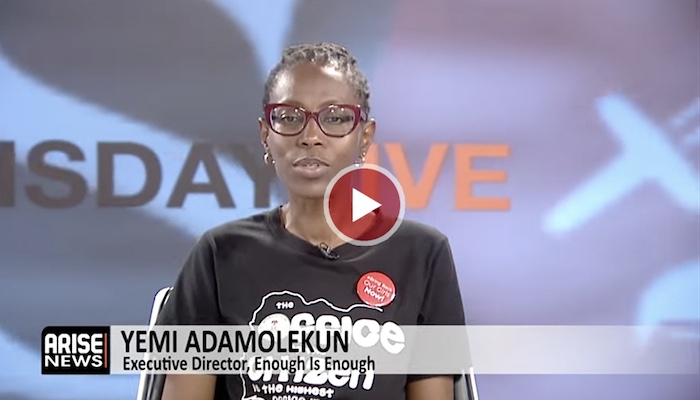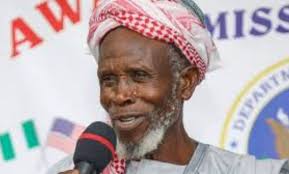

Executive Director of Enough Is Enough (EiE), Yemi Adamolekun, has warned that Nigeria risks slipping into a one-party state as political defections intensify, institutions weaken, and state actors stifle opposition voices.
Speaking in an interview with ARISE News on Sunday, Adamolekun said the trend of politicians “aligning with the centre” under the current administration reflects a deeper democratic crisis rather than the existence of healthy political competition.
“The conversation about a one-party state isn’t about the number of parties we have — it’s about whether they can operate independently without interference,” Adamolekun said. “What we have seen, especially under this administration, is that this independence doesn’t exist.”
She questioned the rationale behind politicians claiming they must align with the ruling All Progressives Congress (APC) to attract federal support, describing it as a dangerous sign for democracy.
“Governors boldly say they want to align with the centre, in a country that’s supposedly pushing for true federalism,” she said. “They get more funds now, have constitutional powers to determine local governments, yet they are defecting because they believe it’s the only way to be protected or attract federal intervention.”
Adamolekun said this behaviour suggests that Nigeria’s democracy is tilting toward coercive centralisation rather than competitive pluralism.
“It is a serious cause for concern. People feel they must join the dominant party to avoid EFCC persecution or to gain federal favour. And when you have an administration perceived to have compromised the judiciary, it becomes even more worrying,” she noted.
Adamolekun criticised the judiciary’s silence over widespread constitutional breaches, particularly legislators defecting without losing their seats despite clear Supreme Court pronouncements.
“The Constitution is clear — if legislators defect without a division in their party, they should lose their seats. There’s even a Supreme Court judgment affirming that. But we’ve not seen it enforced,” she said. “Legislators are decamping at will, violating the Constitution, and there are no consequences. We now live in an environment where the law is optional.”
She linked this erosion of accountability to the challenges facing Nigeria’s electoral process, arguing that no matter who leads the Independent National Electoral Commission (INEC), credible elections are impossible without institutional reform and independence.
“It doesn’t really matter who the INEC chairman is if we don’t have the infrastructure and legal framework to support credible elections,” she said. “The advocacy before his appointment was for a more transparent, multi-stakeholder selection process — not just the president and Senate. That didn’t happen.”
Adamolekun said the new INEC chairman, Professor Jacob Mukhtar, being a lawyer could be significant in a country where electoral outcomes are often decided in court.
“Elections in Nigeria have become the purview of the judiciary,” she observed. “It’s no longer about votes but about judicial pronouncements. It will be interesting to see how a lawyer as INEC chairman navigates that reality.”
Reacting to reports that Edo State Governor Monday Okpebholo directed his commissioners to wear caps bearing President Tinubu’s insignia, Adamolekun described the act as “eye service” that trivialises governance.
“When a governor mandates his cabinet to wear the president’s branded cap, it’s not about identity or loyalty — it’s eye service,” she said. “The disturbing part is that nobody in his cabinet pushed back. That silence is telling. It’s a reflection of a wider culture of political conformity and fear.”
She added that such symbolic displays distract from governance and reinforce the notion that loyalty to individuals, not citizens, determines political survival.
“It’s this whole alignment to the centre that’s carrying everyone along — and that’s very problematic,” she said. “Our democracy is becoming about self-preservation rather than service to the people.”
On the fifth anniversary of the #EndSARS protests and the Lekki Toll Gate shooting, Adamolekun said the government’s failure to deliver justice has deepened youth disillusionment and distrust in leadership.
“October 20 will always remind Nigerians that the state killed its own citizens,” she said. “The Lagos Judicial Panel confirmed it, and the ECOWAS Court of Justice found the federal government guilty. But five years later, there’s still no accountability.”
She said the government’s denial and refusal to act have left many young Nigerians hopeless and detached from national governance.
“A lot of young people now believe the government doesn’t care. Many have left the country; some are still traumatised, others in jail. Only a few continue civic action,” she said.
Adamolekun also criticised the persistent police harassment of peaceful protesters despite constitutional guarantees.
“The Inspector General of Police recently banned protests in Abuja. For what reason?” she asked. “Citizens have a right to peaceful assembly. Instead of supporting civic expression, the police constantly provoke confrontation.”
She urged leaders to learn from the failures of 2020 and commit to accountability, justice, and citizen engagement.
“The government had a simple chance to show sincerity in 2020 by holding the police accountable — it chose not to,” she said. “Until leadership values citizens’ lives and rights, Nigeria cannot move forward.”
Adamolekun concluded that rebuilding trust and defending democracy now rests as much on citizens as on institutions.
“Nigerians must refuse to be silenced,” she said. “We must demand better governance, resist tokenism, and insist that laws are applied equally — otherwise, our democracy will remain a mirage.”
Boluwatife Enome



